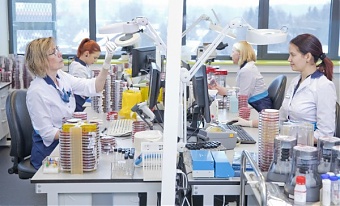Covid-19, Education and Science, Estonia, Markets and Companies, Medicine, Technology
International Internet Magazine. Baltic States news & analytics
Tuesday, 14.10.2025, 17:23
TalTech, Synlab to start developing SARS-CoV-2 rapid tests together
 Print version
Print version |
|---|
The aim of the collaboration between TalTech and Synlab is foremost to develop clinical and point-of-care rapid tests for the detection of SARS-CoV-2. The rapid test using a new method of detection of the virus is meant primarily for family doctors, not for use by patients themselves.
In addition to the presence of coronavirus, the rapid test allows to determine its concentration.
The new approach is based on the molecular imprinting technology developed at the Laboratory of Biofunctional Materials at TalTech. With said technology, synthetic receptors are created in the structure of a polymer which, when encountering virus particles, for instance, are capable of selectively binding them into the polymer's structure. These synthetic receptors will recognize the target molecule, such as virus particles, based on the same principle as biological receptors, but are more stable than the latter in their characteristics and cheaper.
The goal of the first phase of the research work is a sensor chip covered with a synthetic receptor selective for the virus protein, which is ready for use. In the next stage of the work a solution has to be developed for the manufacture of sensor chips rapidly and in big amounts. The sensor chips will then be packaged and be ready for analysis of the viral infection.
Vitali Soritski, senior research fellow at the Laboratory of Biofunctional Materials at TalTech, said that in their research the team of researchers in collaboration with Synlab have compared real-life negative and positive samples and the initial results allow to say that the method works well. Also a prototype has been completed.
The researchers of TalTech have applied for a patent in the United States.
With the help of an ETAG grant and together with the faculty of natural sciences at TalTech, the group of researchers led by Vitali Soritski is already exploring possibilities for using the method for the analysis of saliva and blood samples.
- 28.01.2022 BONO aims at a billion!
- 26.08.2021 LLC Dizozols Investments finalizes investment attraction deal with Crowdestor with record-high profits
- 30.12.2020 Накануне 25-летия Балтийский курс/The Baltic Course уходит с рынка деловых СМИ
- 30.12.2020 On the verge of its 25th anniversary, The Baltic Course leaves business media market
- 30.12.2020 Business Education Plus предлагает анонсы бизнес-обучений в январе-феврале 2021 года
- 30.12.2020 Hotels showing strong interest in providing self-isolation service
- 30.12.2020 EU to buy additional 100 mln doses of coronavirus vaccine
- 30.12.2020 ЕС закупит 100 млн. дополнительных доз вакцины Biontech и Pfizer
- 29.12.2020 В Латвии вводят комендантский час, ЧС продлена до 7 февраля
- 29.12.2020 Latvia to impose curfew, state of emergency to be extended until February 7








 «The Baltic Course» Is Sold and Stays in Business!
«The Baltic Course» Is Sold and Stays in Business!

